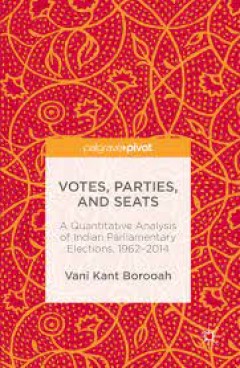Filter by

OPEC in a Shale Oil World
OPec in a sHALE oil world –where to NEXT? With PREFACE by Dr. Sadad Al Husseini , former Board Member and Executive Vice President , Saudi Aramco. "OPEC has played an important role since its founding and continues to do so, but it has to recognize that this role has now changed and the organization has to adapt to new challenges. This book provides some possible solutions" Abdulsamad Al A…
- Edition
- 1
- ISBN/ISSN
- 978-3-319-22370-4
- Collation
- XXX, 269
- Series Title
- -
- Call Number
- -

Nordic-Iberian Cod Value Chains:Explaining salted fish trade patterns
This book is a multidisciplinary analysis of cultural, regional and economic factors affecting international food trade. Contributions from expert authors illuminate the importance of food culture prevailing in the market as a basis for decisions about food trading. Central concepts include value chains, conventions and public infrastructure and their importance for international trade. The …
- Edition
- 1
- ISBN/ISSN
- 978-3-319-16404-5
- Collation
- X, 223
- Series Title
- MARE Publication Series
- Call Number
- -

The Quest to Cyber Superiority
Further, the book demonstrates how a nation’s technological advancement may not necessarily lead to cyber-superiority. It covers cybersecurity issues with regard to conflicts that shape relationships between major economies, and explains how attempts to secure the cyber domain have been hampered by the lack of an international consensus on key issues and concepts. The book also reveals how so…
- Edition
- -
- ISBN/ISSN
- 978-3-319-40554-4
- Collation
- XXIV, 240
- Series Title
- -
- Call Number
- -

The Politics of Pharmaceutical Policy Reform
Brazil is renowned worldwide for its remarkable reforms in pharmaceutical regulation, which have enhanced access to essential medicines while lowering drug costs. This book innovates by analysing the generic drug reform in Brazil, demonstrating that pharmaceutical regulation is only partially influenced by non-state actors. Little is known about the institutional antecedents and policy process…
- Edition
- -
- ISBN/ISSN
- 978-3-319-12565-7
- Collation
- XII, 117
- Series Title
- SpringerBriefs in Political Science
- Call Number
- -

The Political Economy of a Living Wage
This book tells the story behind President Franklin D. Roosevelt’s use of the phrase "living wage" in a variety of speeches, letters, and statements, and examines the degree to which programs of the New Deal reflected the ideas of a living wage movement that existed in the US for almost three decades before Roosevelt was elected president. Far from being a side issue, the previously unexplore…
- Edition
- -
- ISBN/ISSN
- 978-3-319-32473-9
- Collation
- X, 292
- Series Title
- Palgrave Studies in American Economic History
- Call Number
- -

Who’s to Blame for Greece? Austerity in Charge of Saving a Broken Economy
Greece's economy symbolizes in many ways the Eurozone's economic problems and divergent interests as it amasses most of the economic disadvantages characterizing the Eurozone's economy itself. This book presents the economic and political challenges to Greece and the EU member states.
- Edition
- -
- ISBN/ISSN
- 978-1-137-54920-4
- Collation
- XV, 236
- Series Title
- -
- Call Number
- -

The Middle East Economies in Times of Transition
On the growth question, the book looks into the extent of structural transformation of the economy, the political economy reasons for the lack of structural change, and the external conditions in the EU and in the GCC that underpin the lack of structural change. On inequality, the book offers new measures of equality of opportunity in human development and in the job market, and it also reviews…
- Edition
- -
- ISBN/ISSN
- 978-1-137-52977-0
- Collation
- XX, 359
- Series Title
- International Economic Association Series
- Call Number
- -

Water Pricing Experiences and Innovations
Water pricing to achieve conservation in scarce water resources is a major policy challenge. This book provides credible evidence from water pricing experiences in various countries around the world. The book chapters, written by experts in water pricing from various countries, documents the past 10 to 15 years of water pricing experiences in Australia, Brazil, Canada, China, Colombia, France, …
- Edition
- -
- ISBN/ISSN
- 978-3-319-16465-6
- Collation
- XXV, 471
- Series Title
- -
- Call Number
- -

Votes, Parties, and Seats A Quantitative Analysis of Indian Parliamentary El…
This starkly lucid and timely book absorbs the nuances of the largest festival – the elections – of the world's largest democracy. Hailing from a political family, the author conveys his passion and knowledge on the intricacies, as well as the heat and dust of his national fête. All data and events have been methodically examined in this absorbing analytical work which is an indispensable …
- Edition
- -
- ISBN/ISSN
- 978-3-319-30487-8
- Collation
- XVII, 160
- Series Title
- -
- Call Number
- -

The European Union in Crisis
This volume is a comprehensive and rigorous exploration of intertwined issues surrounding the EU's democracy and legitimacy, written in the turbulent context of the financial crisis. The chapters are woven together under four interconnected thematic sections that examine: rapidly growing national euroscepticism; the Economic Monetary Union and its legitimacy; the future of EU integration; and d…
- Edition
- -
- ISBN/ISSN
- 978-3-319-08774-0
- Collation
- XXI, 257
- Series Title
- -
- Call Number
- -
 Computer Science, Information & General Works
Computer Science, Information & General Works  Philosophy & Psychology
Philosophy & Psychology  Religion
Religion  Social Sciences
Social Sciences  Language
Language  Pure Science
Pure Science  Applied Sciences
Applied Sciences  Art & Recreation
Art & Recreation  Literature
Literature  History & Geography
History & Geography